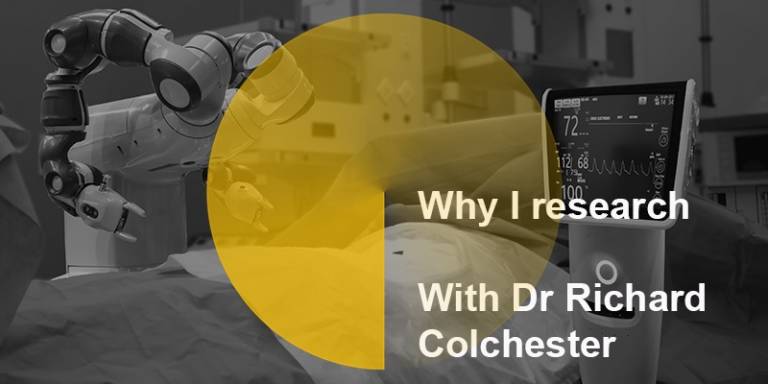On a mission to give equal access to the best quality care and treatment
1 December 2022
We spoke to Richard Colchester about the people and ideas that inspired him in his work at UCL to transform surgery for patients.

Where did it all begin?
This is a hard question to answer. I guess it began during school; I was fortunate to have great science teachers who really encouraged my interest in science. This led me to study Physics at Imperial College, but I always wanted to do something applied, something which would help people. So, I combined my love for Physics and Engineering with Healthcare.
Who inspired you?
I’ve had quite a few bits of inspiration in my life. When I was younger, it was my mum and my dad. My mum was a nurse, and my dad an engineer, so you can see the natural combination of that in the path I took. My dad always encouraged me to find engineering I could do in a lab rather than the messy outside type he did. And whilst I think my mum really wanted me to be a Doctor, I chose to become the other sort of Doctor, which I know she is equally proud of. Now that I am older, my biggest inspiration is my wife. She is an amazing, kind and caring person, and her attitude encourages me to use my skills to give back and help society in the way that I can.
What’s the big idea?
In a nutshell, to make healthcare (specifically surgery) better and more accessible. But to be more specific, I am really interested in making tiny imaging and sensing devices that can be used for imaging inside the human body. These are crucial to help surgeons carry out surgery using only small incisions rather than opening the body. The aim is to give them a view directly from their surgical devices, to help them see the disease and to guide them whilst they treat it. In addition to improving outcomes, I am developing low-cost methods and materials so that these devices can be made more accessible and allow everyone to have equal and successful treatment.
What should we be reading?
My research path has been heavily influenced by the academic papers from my field and others, but this is a little dry for most to read. Outside of this, perhaps bizarrely, one of the most influential series I have read (as evidenced by one of my tattoos!) is the Discworld series by the late Terry Pratchett. His writing had a way of highlighting the injustice in the world and satirising life in a style that always got me thinking. It made me consider how I can help more and be a better person. And not only that, it’s incredibly entertaining, which can help after a long day.
What policy changes would you like to see in your area of expertise?
I would like to see a focus on bringing the bottom up rather than progressing the top. Ultimately new technologies are cool and fun and innovative, as well as improving success rates and allowing the treatments of new disease. But if we can’t provide these treatments to everyone equally and fairly, it defeats the purpose.
What’s the big question?
How can we give everyone equal access to the best quality care and treatment possible?
What’s the answer?
I think the answer is to utilise the technology we have, including AI, data, imaging and sensing, to create low-cost solutions to medical problems. We need to focus on making tools that can be used by everyone and are for everyone. To achieve this, we need to ensure that people from every part of society are included in the development of new tools and treatments. This is the only way to ensure it is appropriate for everyone and to widen participation.
Who or what gives you hope?
First and foremost, my wife. She is an example I strive to emulate. Beyond that, my colleagues and the people I have worked with over the course of my career. The academic and clinical staff that are at UCL and other institutions are genuinely driven to help people and to maximise their positive impact. This and the amazing work that has been produced so far gives me hope that we are heading in the right direction. I am also hopeful because I see a drive for change to include more impact and engagement as a part of core research work.
 Close
Close

